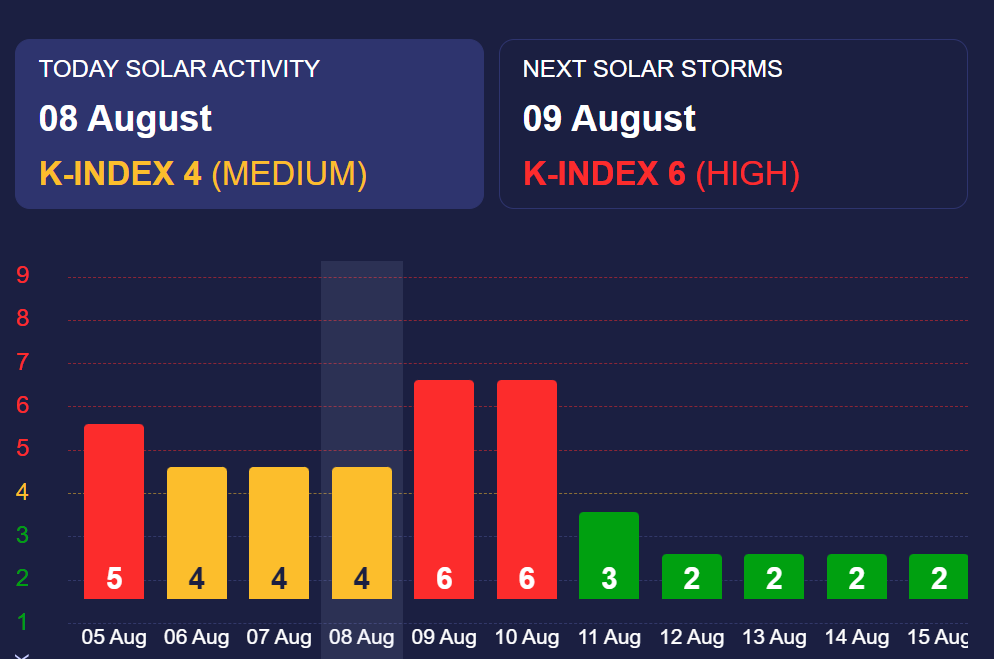Powerful magnetic storm approaching: Timing and health tips
 A powerful magnetic storm will hit the Earth (RBC-Ukraine collage)
A powerful magnetic storm will hit the Earth (RBC-Ukraine collage)
A powerful magnetic storm is set to hit Earth today, August 9, with impacts expected to intensify by midday. Forecasts indicate that this storm will reach a high red level K-index 6 and will last for two days. Such storms can lead to deteriorating health for many people worldwide, according to Meteoagent
What is a magnetic storm?
Solar activity, including flares and eruptions, regularly releases large amounts of solar energy into space. This energy consists of charged particles - protons and electrons - that can move rapidly through space.
When these particles reach Earth's magnetosphere, they cause disturbances known as magnetic or solar storms.
Magnetic storms are categorized by their intensity on a scale from K-index 1 to K-index 9. Storms up to K-index 5 are considered moderate, while those above this threshold are classified as red-level storms, which can impact human health and technological systems.
Such storms can cause headaches, general malaise, weakness, and disruptions in satellite, GPS, and communication systems. During storms with K-index 8-9, polar auroras may also occur.
Upcoming magnetic storm
According to satellite data from NOAA, TESIS, and international meteorological labs, a red-level magnetic storm is expected to begin today, August 9. It will reach a K-index 6.
This storm is predicted to persist with red-level intensity into Saturday, August 10.
Scientists forecast that by Sunday, August 11, the magnetosphere will return to normal conditions.
It’s worth noting that another red-level storm is anticipated from August 13 to 16, reaching a K-index 5.

A powerful magnetic storm is approaching the Earth (screenshot)
How a magnetic storm affects humans
Researchers worldwide have studied the relationship between magnetic storms and human health for years. Many studies and clinical observations support this connection.
Common complaints during magnetic storms include:
- Headaches
- Migraines
- Dizziness
- Weakness
- Sleepiness
- Increased fatigue
- Reduced concentration
- Decreased productivity
- Blood pressure issues
- Mood swings
- Increased anxiety
- Mental fog
- Irritability and aggression
- Exacerbation of chronic conditions
How to reduce the impact of a storm
At the bottom of magnetic storms, doctors give mostly general recommendations: get more rest, breathe fresh air, and follow a normal daily routine.
And also:
- Ensure adequate sleep (7-9 hours)
- Engage in morning exercise
- Maintain a balanced diet throughout the day
- Drink plenty of water
- Avoid excessive caffeine, energy drinks, tobacco, alcohol, and spicy or fatty foods
- Ventilate living spaces
- Spend time outdoors
- Get ample rest
- Avoid physical and emotional overexertion
- Consult healthcare professionals if symptoms worsen
Earlier, we reported on the days when strong magnetic storms are expected in August.
Also, we shared why you may experience a severe headache in the morning.
This material is for informational purposes only and should not be used for medical diagnosis or self-treatment. Our goal is to provide readers with accurate information about symptoms, causes, and methods of detecting diseases. RBС-Ukraine is not responsible for any diagnoses that readers may make based on materials from the resource. We do not recommend self-treatment and advise consulting a doctor in case of any health concerns.

